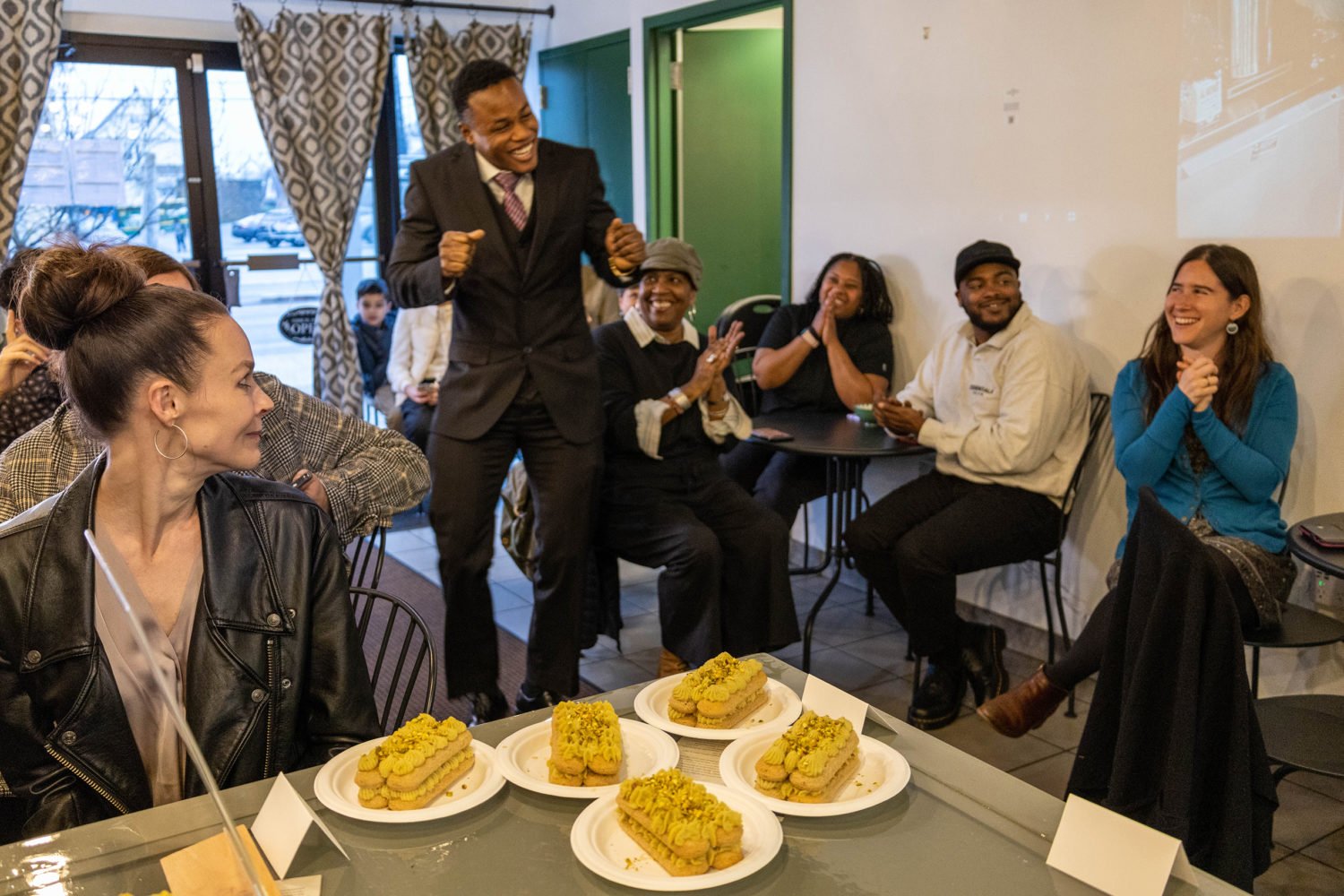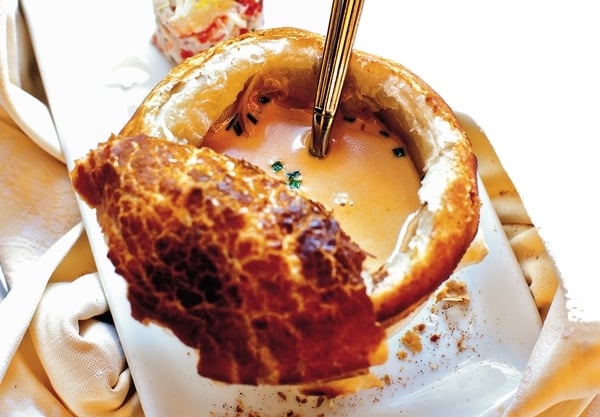
Food and dining sections are filled with reviews of restaurants, profiles of chefs, and analyses of food trends. Seldom do you read about servers, unless it’s a critic singling out a spectacularly shoddy performance from the wait staff or a customer writing in to complain about being ignored.
Yet servers interact with customers more than any other restaurant employee—certainly more than any chef—and the good ones are capable of transforming an ordinary meal into an enjoyable experience, the kind that ensures a repeat visit. The great ones can do even better. They can lift your spirits. They can leave you feeling like a member of a family or part of a community. We thought it was high time we honored the important work they do.
Jana Castle is one of the great ones. She has been waiting tables for 38 years, the last 19 at the Laurel location of Red, Hot & Blue, which remains the best outpost of this local chain. She embodies the qualities that restaurateurs and managers put down on paper when they’re hiring but seldom if ever find: personable, energetic, organized, charismatic, warm, and caring. She has legions of regulars, who stop by the restaurant even if they’re not coming for dinner, just to chat with her. Some attend her husband’s rock-and-roll concerts. Her bosses know her value, and in addition to paying her salary, pick up her health insurance (a benefit accorded four other employees on the payroll). They don’t pay for her sneakers, however. Castle, logging many miles on her feet as she makes her rounds, buys a new pair every two months.
We recently spoke with Castle, who revealed the keys to her longevity and the secrets of the profession.
Why have you stayed at Red, Hot & Blue for so long?
"We have a huge core of regular customers, so I can say hi to six or seven tables that have been coming in over the years. To some of them I’ll talk about gardening, to some it’ll be about their kids; it’s just what I know about them that allows me to interact. It’s nice to go into a restaurant where people know you. Last week, I waited on people who live in Korea, who have been coming in since the restaurant opened. Every summer they come over to America for three weeks. When they’re here, they come in at least once a week.”
What are the essentials to good service?
“Personalize the service rather than offer up a really formal introduction. You have to be the master of organization. But my job is to make them feel like they’re the only customer. Thirty-eight years in the business has taught me to look around and anticipate what someone needs.”
How physically painful is it for you to be on your feet all night? How bad can it get?
“Sometimes there are nights where I walk out the back door and each step I take I say ‘ow, oy’ out loud and do the same thing walking into my house. My favorite part of the day is when I lay down in my bed and can give my feet a break. I’m 54, so it gets harder the older I get. I’d challenge any one to walk a day in my shoes. Physically, it’s unbelievably tough, and when I see these ladies in diners that have probably been there as long as I have been alive, I think, ‘Wow, what must their feet feel like?’ ”
What do you look for in a server when you go out to eat?
“I expect the fundamentals: order to be right, greet in a timely manner, and check back. I’m a trainer for Red Hot & Blue so I know the drill. But if I get more than the fundamentals it makes me really happy. My one pet peeve is when you take people’s money off the table and don’t say that you’ll be back with change, it’s obnoxious. I also feel that when a customer shows appreciation with a nice tip, it’s important for me to go back and recognize that by going back and thanking them. I was in a restaurant with friends and our bill was $60, and we all threw in money to make it $100. But the waitress never bothered to come back. I was served enough beers that I marched over and told her: ‘It’d be nice of you to recognize the fact that we helped you out.’ ”
What’s the worst situation you’ve faced as a server? How did you handle it, and how did the customers respond?
“I think that it’s consistently people who are self-absorbed. My whole thing is interacting, and when people can’t get off their cell phone long enough or acknowledge it when I walk up to the table, I feel that I’m insignificant. The worst is when people don’t respond to the fact that I’m there. I’m one of those people who take the challenge and kill them with kindness. If someone has an attitude, I’ll fawn over them and say ‘How is everything?’ and make sure that they’re happy. Attitude creates more attitudes. I go the other direction.”
What night, if any, sticks out the most in your memory?
“A customer starting choking on a piece of sausage, and I ran over because the customers who were doctors weren’t doing anything, but he was so large I couldn’t get my arms around him. So another server came over and we used the Heimlich. I brought him a glass of water and then turned around to ask the next table what they wanted to order. They were shocked that I could turn around and just do that. The bill for the table where I saved man’s life was $18, and they left a $20 bill on the table. I would have left $20 in addition to the bill if someone saved my life. But I got enough back patting from the rest of the tables that it was ok. That guy still comes in—we call him the Sausage Man. He still orders the same sausage dish.”
You have a lot of regulars.
“There are people that when they come in the door, it’s nice to be able to catch up with them. For example, there was a table from Germany that had such a good time and really enjoyed the food. I really enjoyed interacting with them. I was pleased because in their interpretation of the American tip system, $10 on a $102 bill was an excellent tip, and they made a special point of handing it to me in cash and said it was the best food they had in America. It wasn’t about the money, it was about the fact that they would be talking about it in Germany. Sometimes it’s not about the money, it’s about the experience.”
What does the average person not know about being a server?
“It’s the ultimate organizational challenge because you will not be successful as a server if you do one thing at a time. You have to excel at multi-tasking and remember that you need to pull up a check after ringing an order, grab the refill and the appetizer plates, and drop them off as you start your next round. I think most people don’t realize that you multiply that by 10 to 12 tables.”
Do you think that any person can become a great server? Or is it something innate that only people with a particular personality can do?
“You have to be a certain kind of person. There are a lot of people who have gone into the industry and then found out that they aren’t that kind of person. If you’re good at always dealing with people, then this is your niche. It helps in all aspects of life to be able to walk up to strangers and strike up a conversation. I’m just a social person, and it pays off at parties and in the grocery store. You have to walk the line between being sincere and a really good actor/comedian. When someone asks me what the difference between the ribs is, I try to explain it like it’s the first time I thought of it—then it’s personal. You have to be outgoing and sincere and a good actor so they believe that you care about what you’re talking about.”
More>> Best Bites Blog | Food & Dining | Restaurant Finder
Follow the Best Bites Bloggers on Twitter at twitter.com/bestbitesblog













